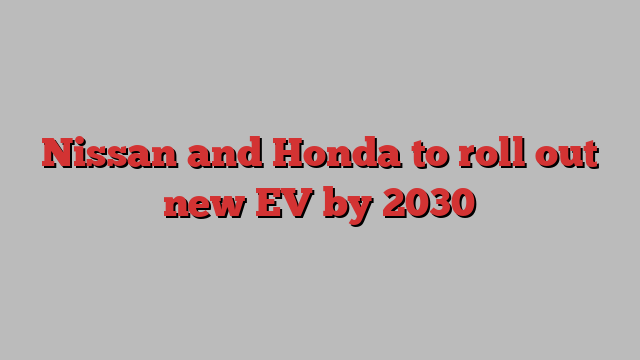
Stay informed with free updates
Simply sign up to the Electric vehicles myFT Digest — delivered directly to your inbox.
Nissan and Honda will aim to roll out a new electric vehicle before the end of the decade as the two Japanese carmakers outlined a sweeping alliance to compete against Tesla and Chinese rivals.
On Thursday, the two rivals said they had agreed to jointly develop EV software and mutually supply each other with batteries. The chief executives of both companies did not rule out a capital tie-up in the future, adding that the collaboration, first announced in March, will not be limited to electric cars.
“In the fields of electrification and intelligence, the speed of change . . . is well beyond what we had expected,” Honda’s chief executive Toshihiro Mibe said at a joint news conference in Tokyo. “If we don’t move now, we won’t be able to catch up [with the new players].”
China has taken a commanding lead in EVs and battery technology, propelled by large government subsidies which allowed it to compete with the world’s biggest carmakers. BYD, the Shenzhen-based company backed by Warren Buffett’s Berkshire Hathaway group, is now engaged in an all-out battle with Tesla for the title of the world’s biggest EV seller.
Japan’s second- and third-largest carmakers have both faced questions from investors about whether they had enough scale and financing to compete in the EV race, having lost its market share in China, the world’s largest car market.
The two companies said the partnership would also include Mitsubishi Motors, pitting the three groups against Toyota, which has a loose alliance that includes Mazda, Subaru, and Suzuki. Honda also has a separate joint-venture with Sony that plans to start delivering its software-focused electric vehicle to North America by 2026.
Nissan boss Makoto Uchida stressed that it would maintain its existing alliance with France’s Renault in Europe, while its partnership with Honda would be in other regions. The Franco-Japanese alliance was once central to Nissan’s global ambitions but it was pared back significantly in the wake of the ousting of former chair Carlos Ghosn.
“I get asked all the time if this means the end of our relations with Renault, but that’s definitely not the case,” Uchida said. “But Nissan still has many challenges to compete globally so we are partnering with Honda to expand our growth.”
The deal with Honda came as Nissan’s operating profit plummeted 99 per cent in the first quarter due to its struggles in the US. The carmaker missed out on the resurgence in sales of hybrid vehicles, which consumers have turned to as an alternative to full EVs.
Nissan sold 3.4mn vehicles in 2023 while Honda sold 4.2mn, compared with more than 11mn for Toyota, the world’s largest carmaker by sales.
Toyota posted a 17 per cent increase in first-quarter profit as the weak yen and strong demand for hybrids in the US overcame falling sales in its home market of Japan.
The group said that operating profit in the April to June period came in at ¥1.3tn, roughly in line with analyst expectations. However, its shares closed down more than 8 per cent after the company failed to increase its full-year forecasts, disappointing some investors.
Shares in Nissan closed down 2.3 per cent in Tokyo, while Honda fell 4.4 per cent on concerns about the yen’s strengthening following an unexpected rate rise by the Bank of Japan.